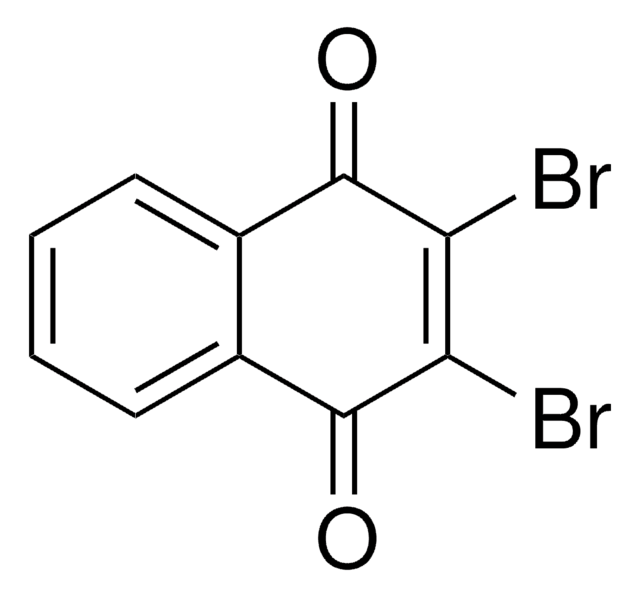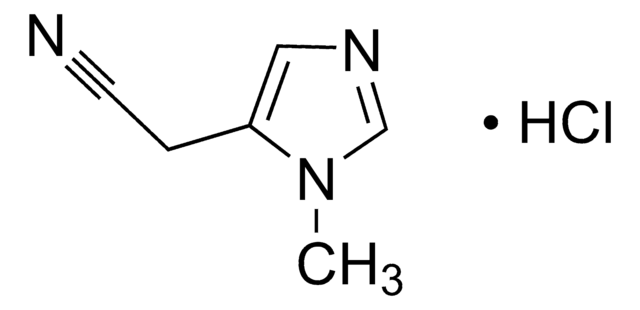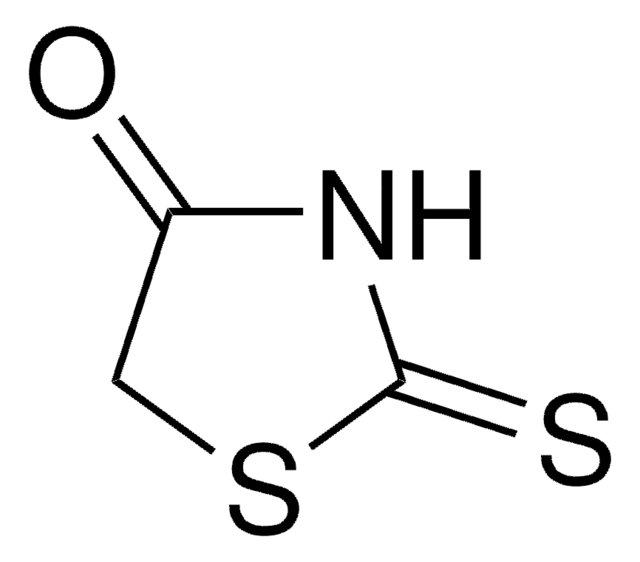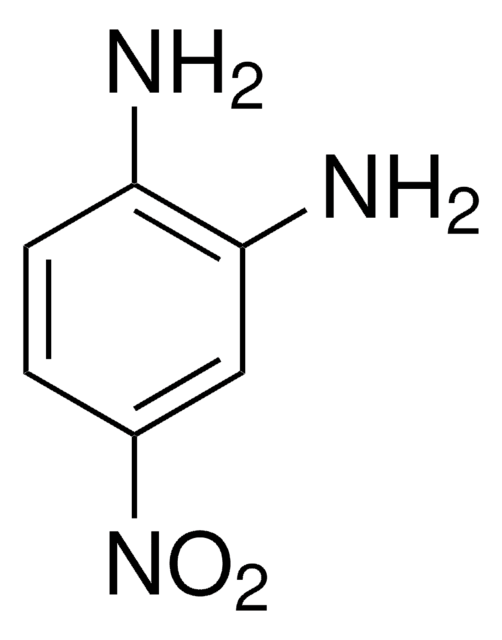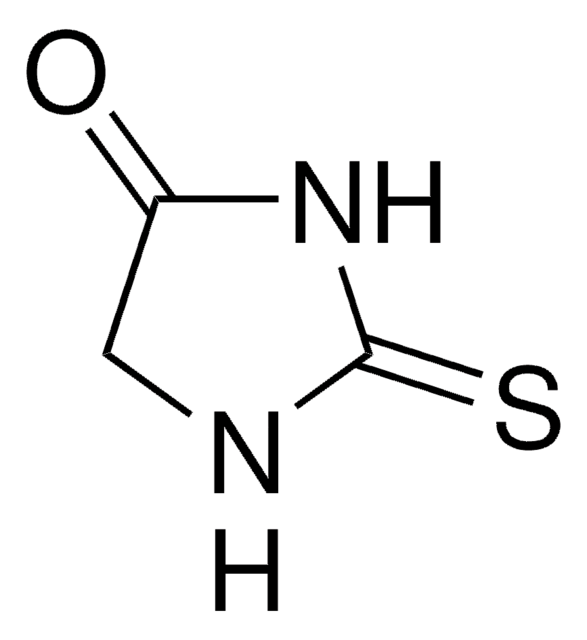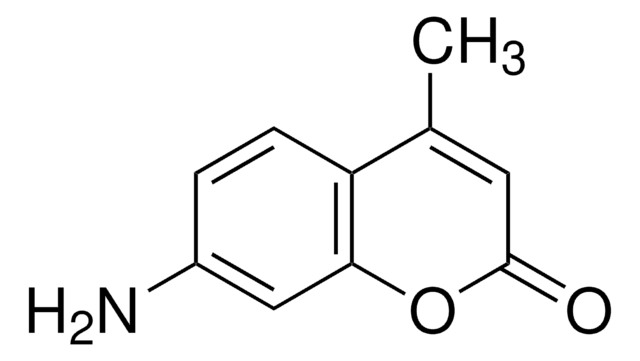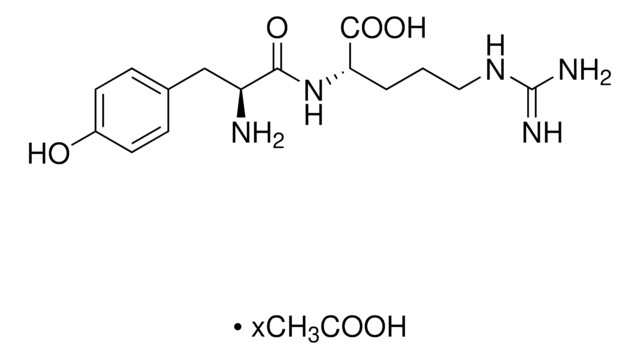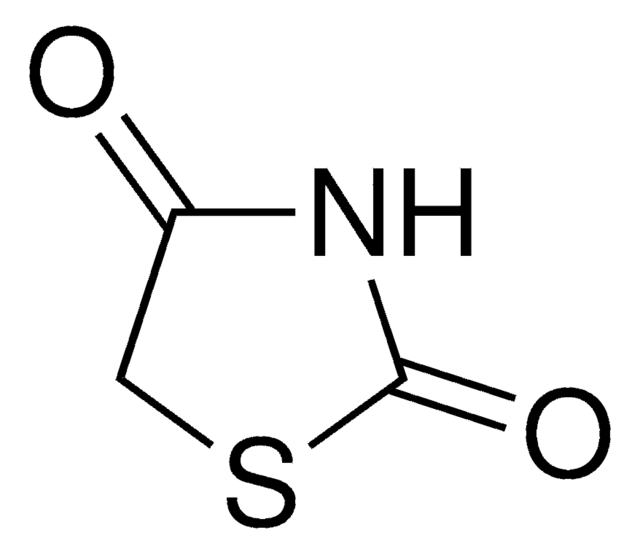CRM04144
Dichlon
certified reference material, TraceCERT®, Manufactured by: Sigma-Aldrich Production GmbH, Switzerland
동의어(들):
2,3-Dichloro-1,4-naphthoquinone, Dichlon
로그인조직 및 계약 가격 보기
모든 사진(1)
About This Item
실험식(Hill 표기법):
C10H4Cl2O2
CAS Number:
Molecular Weight:
227.04
Beilstein:
1073511
MDL number:
UNSPSC 코드:
41116107
NACRES:
NA.24
추천 제품
Grade
certified reference material
Quality Level
제품 라인
TraceCERT®
grade
TraceCERT®
유통기한
limited shelf life, expiry date on the label
제조업체/상표
Manufactured by: Sigma-Aldrich Production GmbH, Switzerland
mp
194-197 °C (lit.)
SMILES string
ClC1=C(Cl)C(=O)c2ccccc2C1=O
InChI
1S/C10H4Cl2O2/c11-7-8(12)10(14)6-4-2-1-3-5(6)9(7)13/h1-4H
InChI key
SVPKNMBRVBMTLB-UHFFFAOYSA-N
유사한 제품을 찾으십니까? 방문 제품 비교 안내
관련 카테고리
일반 설명
This certified reference material (CRM) is produced and certified in accordance with ISO/IEC 17025 and ISO 17034. This CRM is traceable to primary material from an NMI, e.g. NIST or NMIJ. Certified content by quantitative NMR incl. uncertainty and expiry date are given on the certificate. Download your certificate at: http://www.sigma-aldrich.com.
Dichlone is a fungicide that belongs to the quinone class. Dichlone alters the permeability of the cell membrane in fibroblastic cells. It rapidly enters the cell and stimulates oxygen uptake.
Dichlone is not approved in the European Union. A default MRL of 0.01 mg/kg has been set according to Art 18(1)(b) Reg 396/2005.
Dichlone is used to control various fungi in fruit, vegetables, ornamentals, and field crops, particularly blossom blights, scab in apples and pears, and brown rot in stone fruit.
Dichlone is a fungicide that belongs to the quinone class. Dichlone alters the permeability of the cell membrane in fibroblastic cells. It rapidly enters the cell and stimulates oxygen uptake.
Dichlone is not approved in the European Union. A default MRL of 0.01 mg/kg has been set according to Art 18(1)(b) Reg 396/2005.
Dichlone is used to control various fungi in fruit, vegetables, ornamentals, and field crops, particularly blossom blights, scab in apples and pears, and brown rot in stone fruit.
애플리케이션
It is intended to be used as a certified reference material (CRM) for calibration in chromatography and other analytical techniques. Dichlone CRM may also find its use as mentioned below:
- To evaluate the toxicity of some naturally occurring quinones and easily synthesized quinone derivatives on the two-spotted spider mite and three aphid species in laboratory and greenhouse conditions
- To assess antifeedant and toxic effects of selected quinones against the cabbage looper, Trichoplusia ni larvae
- Evaluation of four 1,4-naphthoquinones and 10 pyrimidinone-fused 1,4-naphthoquinones for antimicrobial activity against drug-resistant oral bacteria
- To determine the effectiveness of the use of Supercritical Fluid Extraction (SFE) and Supercritical Fluid Chromatography (SFC) techniques in the analysis of the levels of pesticide residues in canned foods, vegetables, and fruits
추천 제품
Find a digital Reference Material for this product available on our online platform ChemisTwin® for NMR. You can use this digital equivalent on ChemisTwin® for your sample identity confirmation and compound quantification (with digital external standard). An NMR spectrum of this substance can be viewed and an online comparison against your sample can be performed with a few mouseclicks. Learn more here and start your free trial.
법적 정보
TraceCERT is a registered trademark of Merck KGaA, Darmstadt, Germany
신호어
Danger
유해 및 위험 성명서
Hazard Classifications
Acute Tox. 3 Oral - Aquatic Acute 1 - Aquatic Chronic 1 - Eye Irrit. 2 - Skin Irrit. 2
Storage Class Code
6.1C - Combustible acute toxic Cat.3 / toxic compounds or compounds which causing chronic effects
WGK
WGK 3
Flash Point (°F)
Not applicable
Flash Point (°C)
Not applicable
가장 최신 버전 중 하나를 선택하세요:
Mohamed H El-Saeid
TheScientificWorldJournal, 3, 1314-1326 (2004-02-03)
Multiple pesticide residues have been observed in some samples of canned foods, frozen vegetables, and fruit jam, which put the health of the consumers at risk of adverse effects. It is quite apparent that such a state of affairs calls
Structural and functional changes in mouse fibroblast cells treated with 2,3-dichloro-1,4-naphthoquinone (dichlone)
Saxena J, et al.
Pesticide Biochemistry and Physiology, 185-200 null
자사의 과학자팀은 생명 과학, 재료 과학, 화학 합성, 크로마토그래피, 분석 및 기타 많은 영역을 포함한 모든 과학 분야에 경험이 있습니다..
고객지원팀으로 연락바랍니다.